Mozambique: Matola Mayor visits 'xivotchongo' factories - Watch
Mozambique elections: Government community radio censorship, arson attack – By Joseph Hanlon
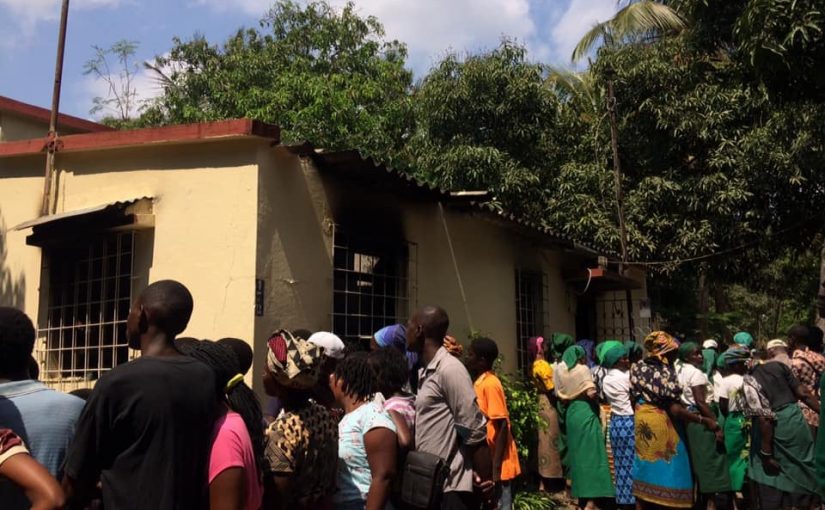
People gather around the home of Manuel de Araújo's mother in Quelimane, yesterday. Mother and guard were saved by the neighbours. Photo: Sala da Paz
Government community radio journalists censored during election period
Community radio journalists working for the 60 community radio stations run by the government’s Institute of Social Communication (ICS) across the country are barred from engaging in outside journalism and observation activities, according a circular dated 11 September 2019.
“Staff and volunteers of the ICS are barred from establishing links or providing services as correspondents to social, national and foreign media outlets, to non-government organisations, as well as acting as electoral observers,” says the circular, signed by the ICS Director-General, Farida Abdula. She makes clear that community radio staff are civil servants or agents of the state, and thus subject to the ICS Editorial Policy, the Press Law, the Law on Public Probity, the Code of Conduct for State Officials and the Staff Regulations for State agents which bans such activities.
But this is not true. The Mozambique Constitution states that “the State guarantees the exemption of the public sector media as well as the independence of journalists from the Government, the administration and other political powers.” Thus, even if ICS journalists and volunteers are civil servants, they are exempt from these controls, and the circular limits a constitutional right to all journalists.
In Mozambique, where much of the population has no access to conventional media, community radio plays an important role in bringing information to communities. There are about 140 community radios in Mozambique, 60 of which are controlled by the ICS, 50 affiliated to the National Forum of Community Radios (FORCOM) and the rest under the Ministry of Science and Technology.
During the electoral period, the Government appears to be exerting pressure on the public press as a whole. ICS is the most vulnerable; community radio stations are located in districts far from urban centres and its journalists are relatively inexperienced.
A recent investigation of the Bulletin concluded that the Government is implementing a plan to increase political control over independent community radios, and this ICS circular near elections fits this strategy. (The circular is on bit.ly/ICS-ban).
Election Documents
Key election documents are being posted on the Bulletin’s election website: https://cipeleicoes.org/documentos/
This includes:
+ our observer manual;
+ officials guides for polling station members, police and others;
+ registration data:
+ parties in various provinces; and
+ party manifestos
Parties blocking community radio coverage of campaign
Political parties are blocking free coverage of the election campaign by community radio journalists. Three cases were reported in the city of Maputo and in Zambezia province where both Frelimo and Renamo supporters interfered with the work of journalists.
“I took some pictures with my cell phone and that bothered the Frelimo people who grabbed my cell phone to erase the images,” said a journalist for Community Radio Voz Coop. The incident took place this morning in Maputo city. Frelimo supporters held the journalist, and individuals on the scene had to intervene to get the accredited journalist released.
In Milange district, Zambezia, members of both Frelimo and Renamo are trying to block Thumbine Community Radio journalists from impartial coverage of the election campaign, the National Community Radio Forum (FORCOM) said in a statement sent to the Bulletin today.
“The Secretary of the Mozambican Youth Organisation (OJM), the Frelimo arm in Milange, Xadreque Matias, on 16 September contacted journalist Zezito Chingamuca accusing the radio of favoring opposition parties over his own. He prevented the journalist this morning (16 Sept) from covering Frelimo’s election campaign at the Majaua Administrative Post,” reported FORCOM.
“Another case involves Renamo. This party’s Delegate Joaquim Dinala accused journalist Beto Carlos on 12 September of making cuts in his speeches during broadcasts, benefiting Frelimo. On the other hand, MDM delegate, Lino Caetano, on 13 September claimed that the radio was highlighting the Frelimo and Renamo campaigns more. FORCOM stresses Radio Thumbine edited out only the parts of speeches that incited violence and hatred, in line with the electoral law.
Manuel de Araujo’s mother’s house burned
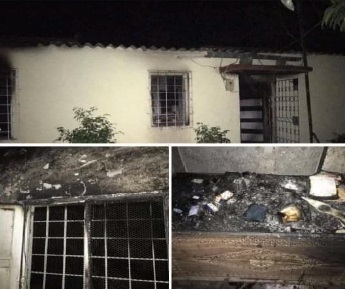
Five people, masked and armed with firearms, tied up the guard, entered the residence, and using jerry cans of petrol, set it on fire at dawn this morning. Neighbours said the attackers intended to kill the occupants. The house in Coalane II neighbourhood of Quelimane belongs to the mother of Manuel de Araujo, mayor of Quelimane and Renamo candidate for governor of Zambezia. Mother and guard were saved by the neighbours.
The attack comes at a time when Renamo presidential candidate Ossufo Momade is campaigning in Zambezia province.
Speaking this morning in front of his mother’s destroyed home, Araujo accused Frelimo members of being the perpetrators. “We publicly and directly accuse the Frelimo party and its candidate Filipe Jacinto Nyussi, who until today has not distanced himself and condemned publicly and unequivocally the violent acts perpetrated by members of his party not only Zambezia (Pinda, Morrumbala, Inhassunge, Derre) but elsewhere in the country,” he wrote on his facebook page yesterday.
24 dead, 145 injured and 37 arrest in two weeks of campaigning
From the start of the campaign until Sunday, 15 September, there have been 24 deaths, 145 injured and 37 people detained in connection with the election campaign. The main cause of death and injury has been traffic accidents and the 11 September crush in the Nampula stadium which killed 10 people and injured 98 after a showmicio with President Filipe Nyusi.
Except for the tragedy in Nampula, our 486 correspondents across the country reported fewer deaths, injuries and arrests in the second week compared to the first.
There were two other deaths in the second week, also in Nampula and again in a traffic accident. In Memba district, two police officers died and three others were injured on 12 September when a police car overturned while heading for Nacala Porto to reinforce the security of Filipe Nyusi’s campaign.
In another Nampula car crash, four people were injured in the village of Luluti, Mugovolas district, when a car carrying Frelimo members for Mputu overturned on 10 September.
Fights between party members led to 7 people being injured in fights between participants in ND and Frelimo parades in Chokwe. Two other cases of assault injuries among political party supporters were reported in Tete province, in Chifunde and Moatize districts.
Only five arrests were reported in the second week. Three people were arrested on 7 September for vandalising propaganda material in Inhambane province. One arrest was in Gaza for alleged involvement in aggression and in one case in Nampula for vandalizing propaganda material.
Over the two weeks, Nampula is the province with the most deaths recorded since the start of the election campaign, 12. Manica follows with 6, Sofala with 3, Zambezia with 2 and, Cabo Delgado with 1.
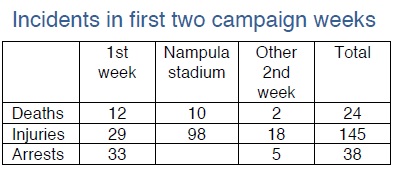
A table of incidents in first two campaign weeks in the attached pdf version of this bulletin.
Malema: attack or armed robbery?
An armed attack on vehicles in Malema, Nampula, Friday 13 September was confirmed by the police, who says it was an armed robbery and not an insurgent or Renamo attack. Neither have occurred before in Nampula.
During a press briefing today (16 September), Malema police district commander Helio Manhique, said three unknown individuals targeted a public transport bus from Malema to the city of Nampula, with about 50 passengers.
Manhique said that in this robbery, one person was shot dead and others received minor injuries. The robbers stole cell phones and some passenger’s wallets with money, valued at about 80,000 meticais ($1300), Manhique said.
A side effect of the attack was that Mario Albino, presidential candidate for the United Movement for Integral Salvation (AMUSI), says he has interrupted a trip begun last Friday to Niassa, Zambezia, Tete and Manica provinces due to a lack of police escort. Police protecting him were withdrawn to help the victims of the armed attack in Malema.
“We were following the trip and momentarily the police protecting us disappeared and when we investigated we learned that we would have been asked to help our brothers. We could do nothing but return,” said Mario Albino.
This would have been the AMUSI candidate’s first trip to a province outside Nampula since the election campaign began on 31 August.
By Joseph Hanlon



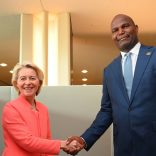
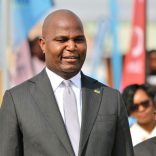
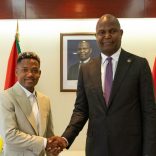
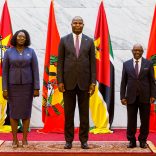
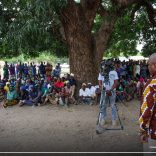



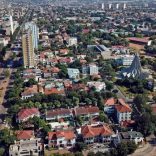
Leave a Reply
Be the First to Comment!
You must be logged in to post a comment.
You must be logged in to post a comment.